
1
Not life, but good life, is to be chiefly valued.Socrates
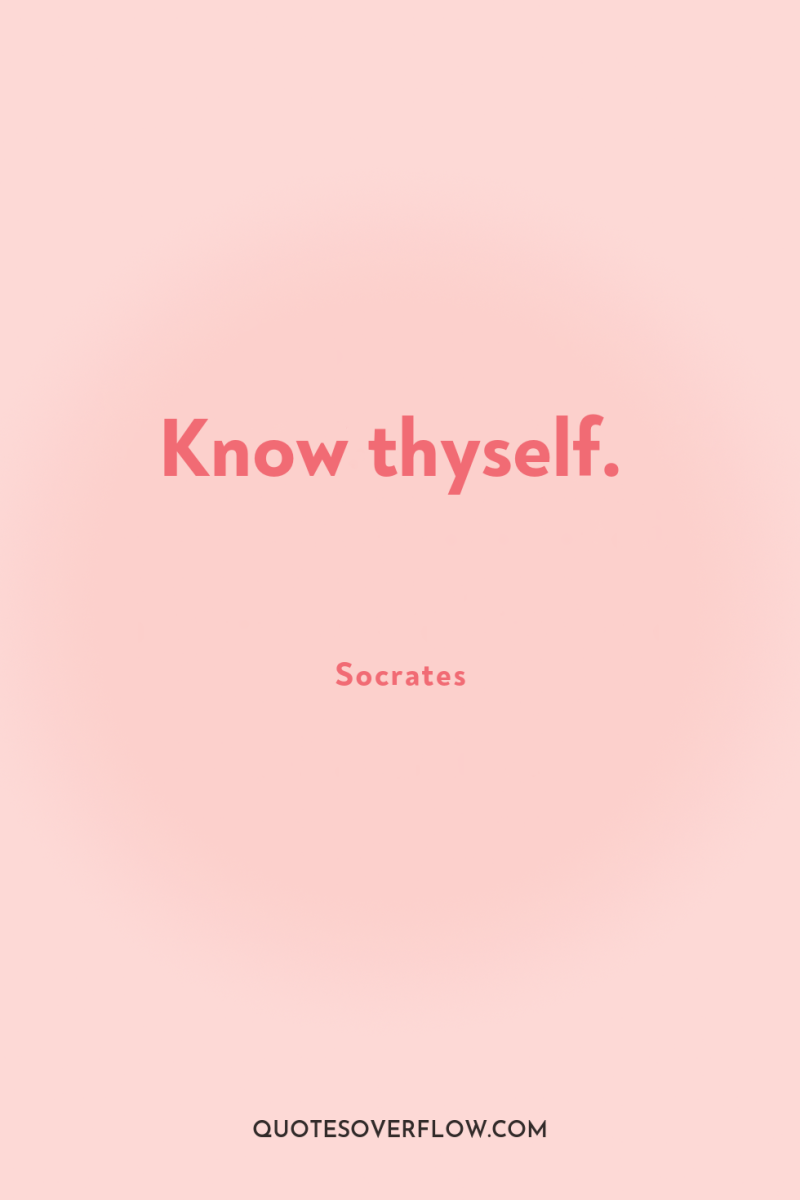
2
Know thyself.Socrates
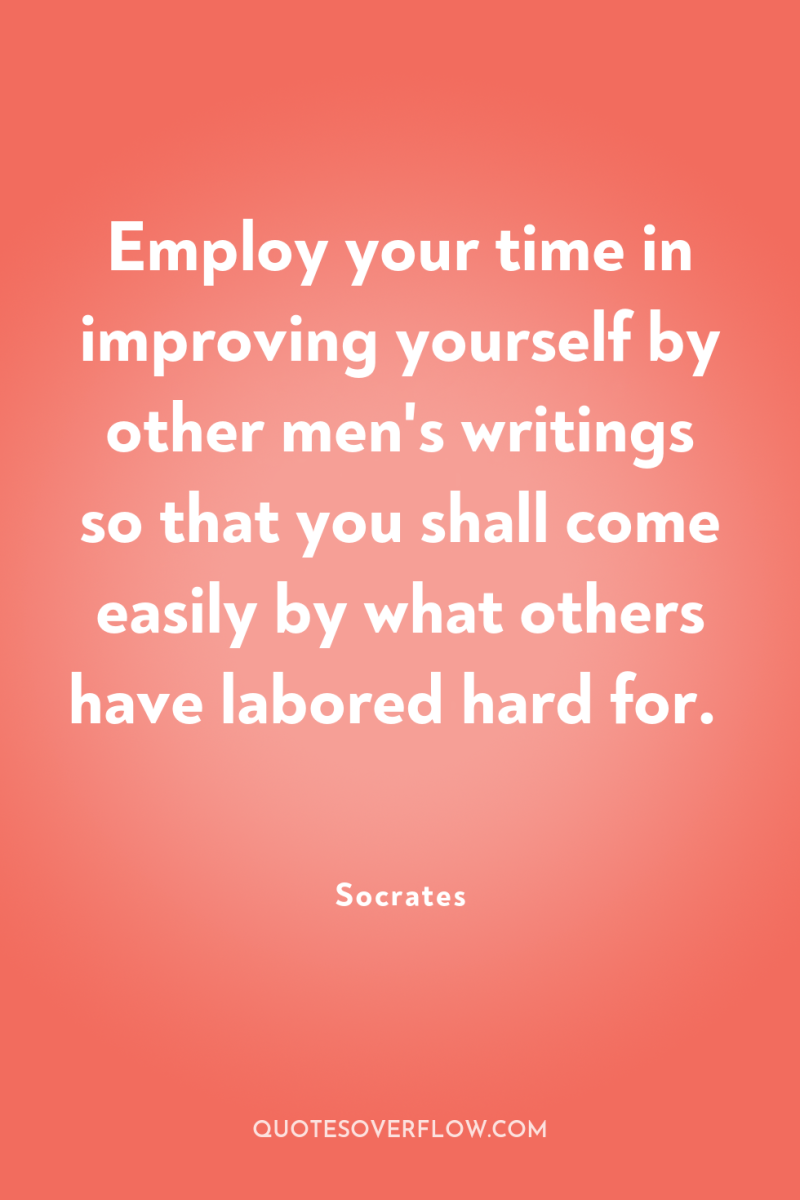
3
Employ your time in improving yourself by other men's writings so that you shall come easily by what others have labored hard for.Socrates
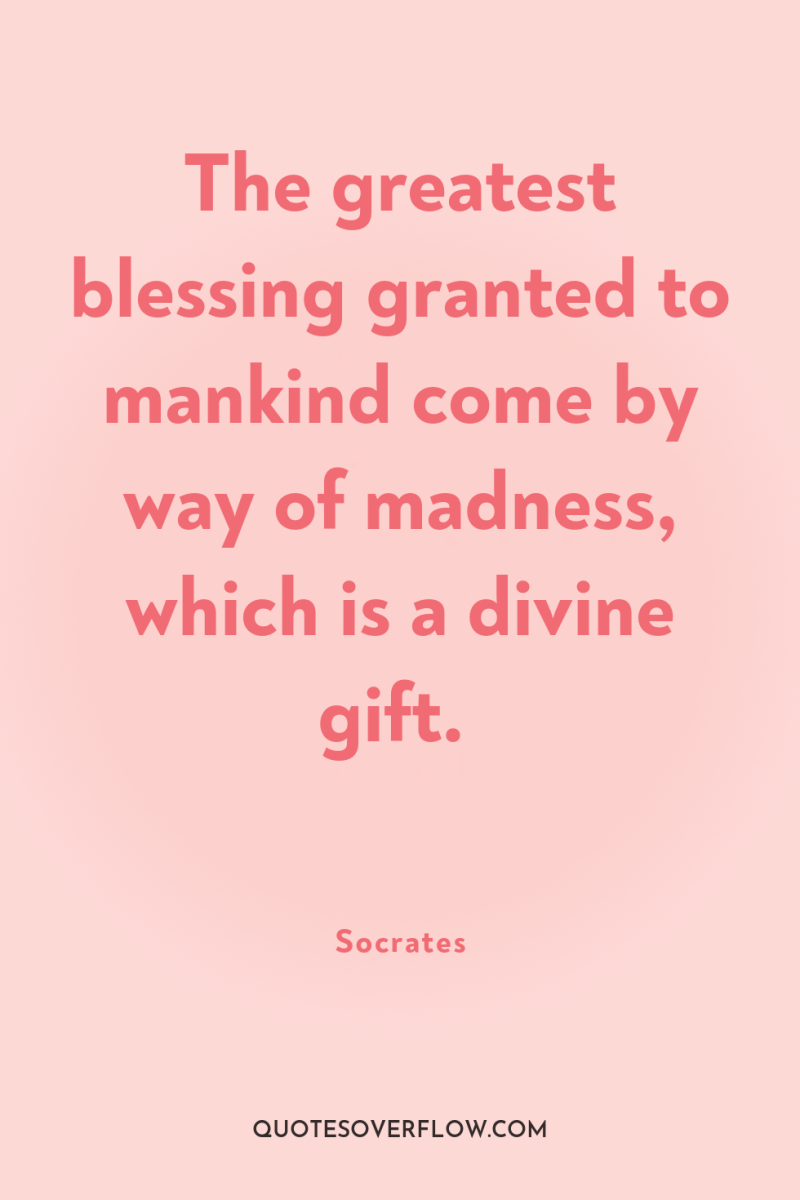
4
The greatest blessing granted to mankind come by way of madness, which is a divine gift.Socrates
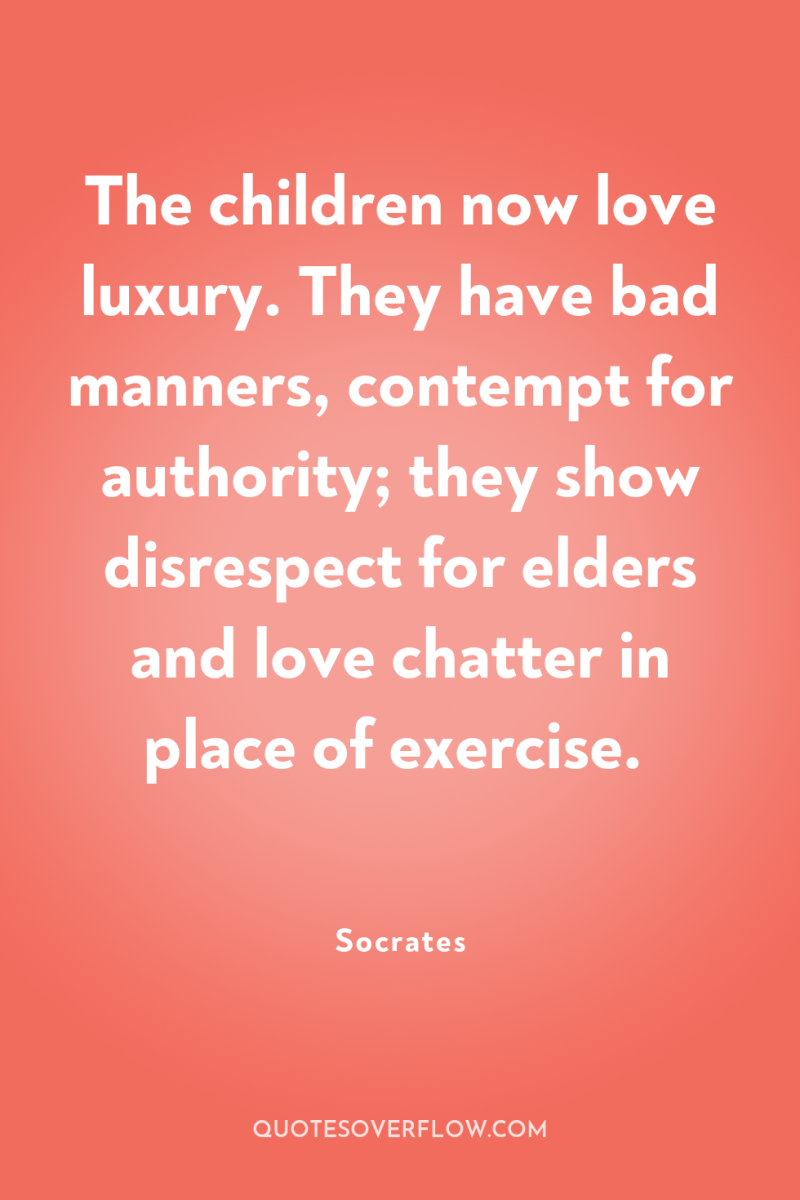
5
The children now love luxury. They have bad manners, contempt for authority; they show disrespect for elders and love chatter in place of exercise.Socrates
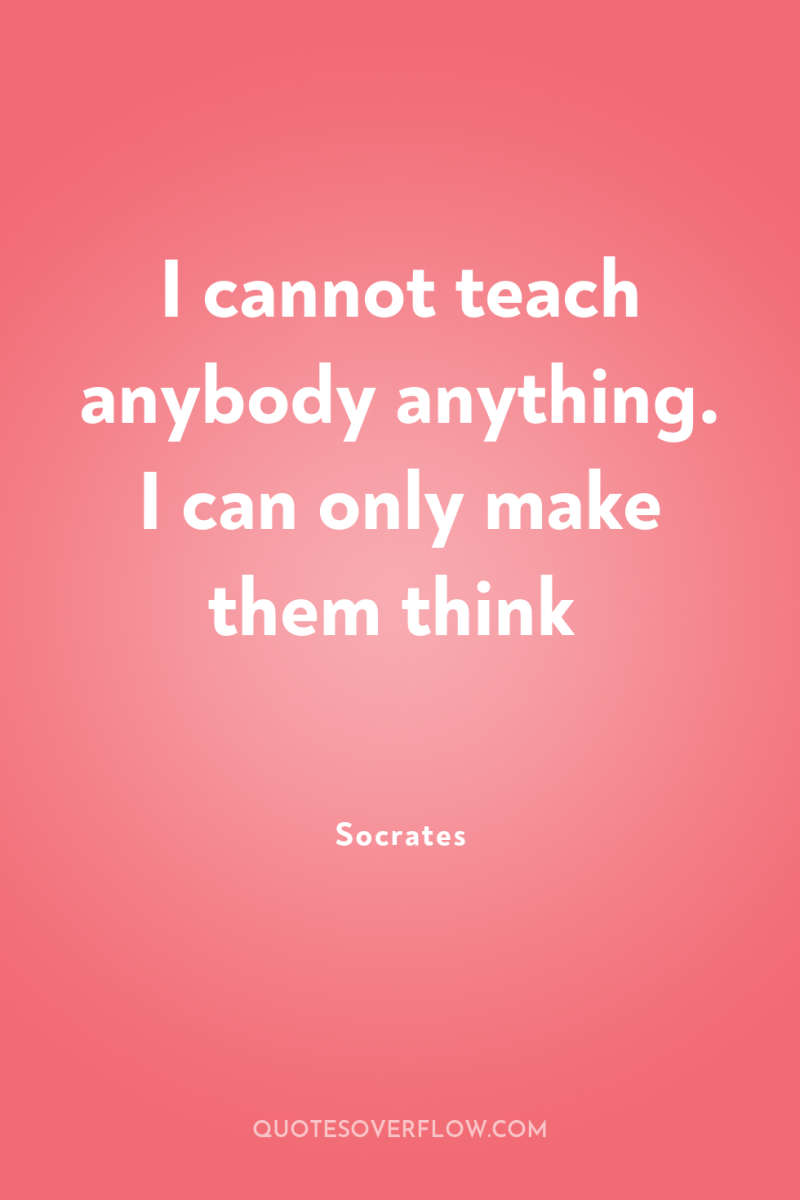
6
I cannot teach anybody anything. I can only make them thinkSocrates
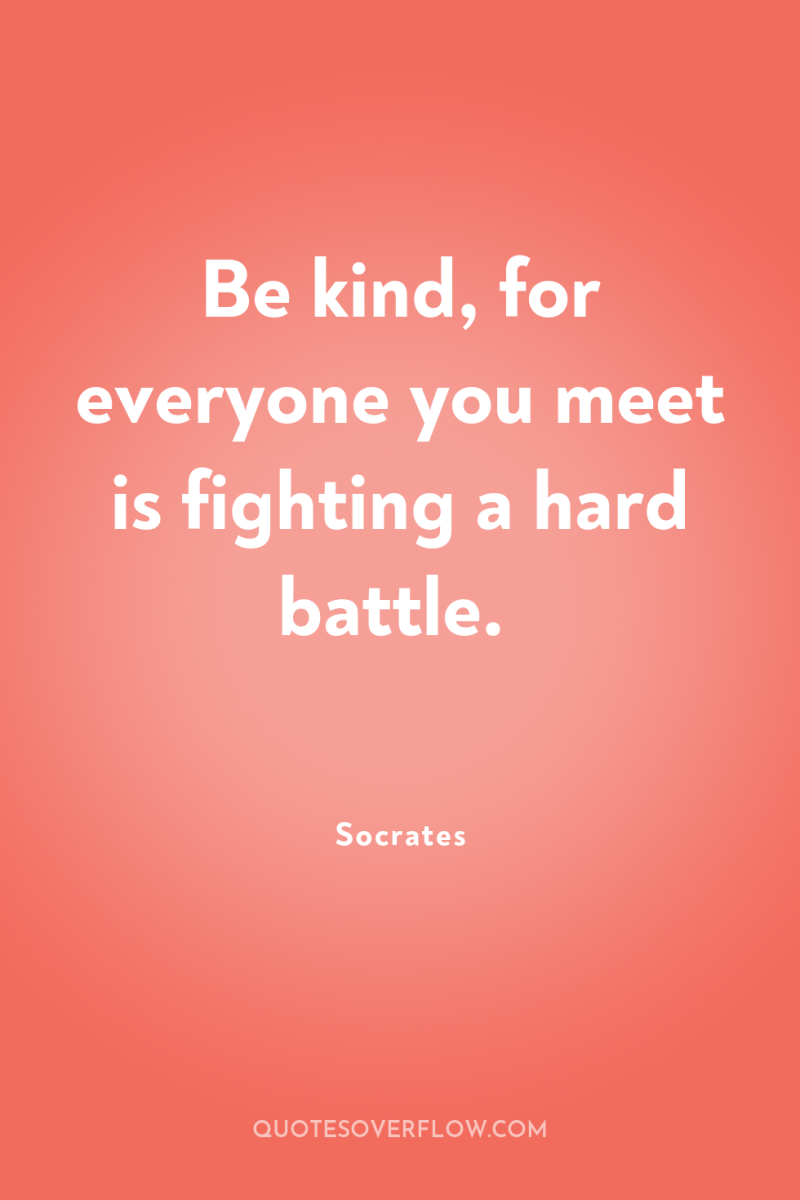
7
Be kind, for everyone you meet is fighting a hard battle.Socrates
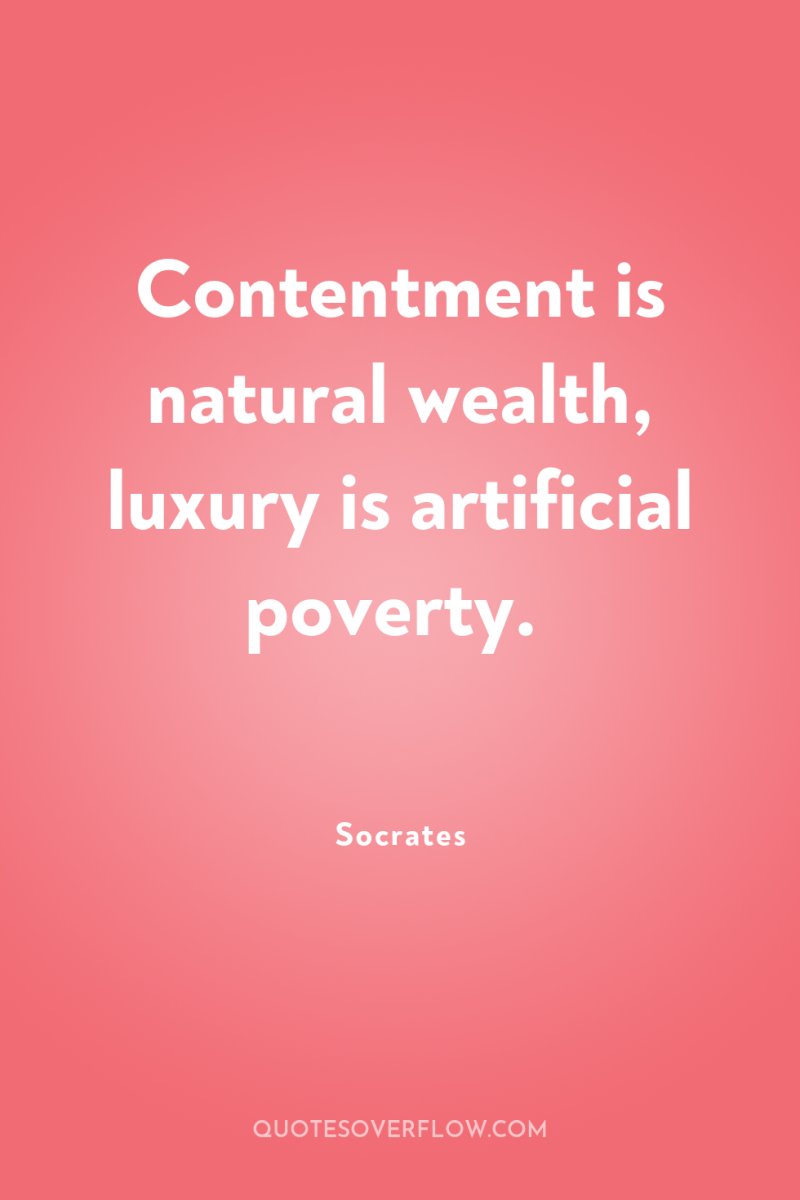
8
Contentment is natural wealth, luxury is artificial poverty.Socrates
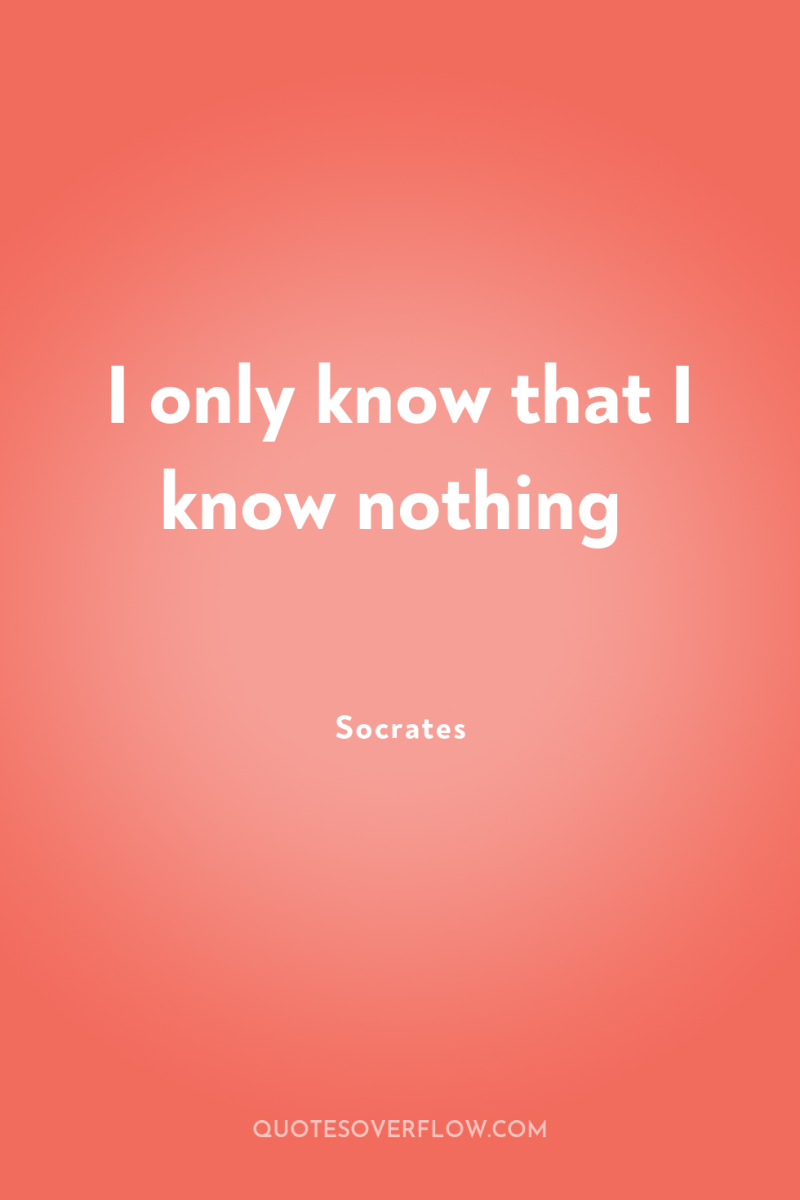
9
I only know that I know nothingSocrates

10
My advice to you is get married: if you find a good wife you'll be happy; if not, you'll become a philosopher.Socrates
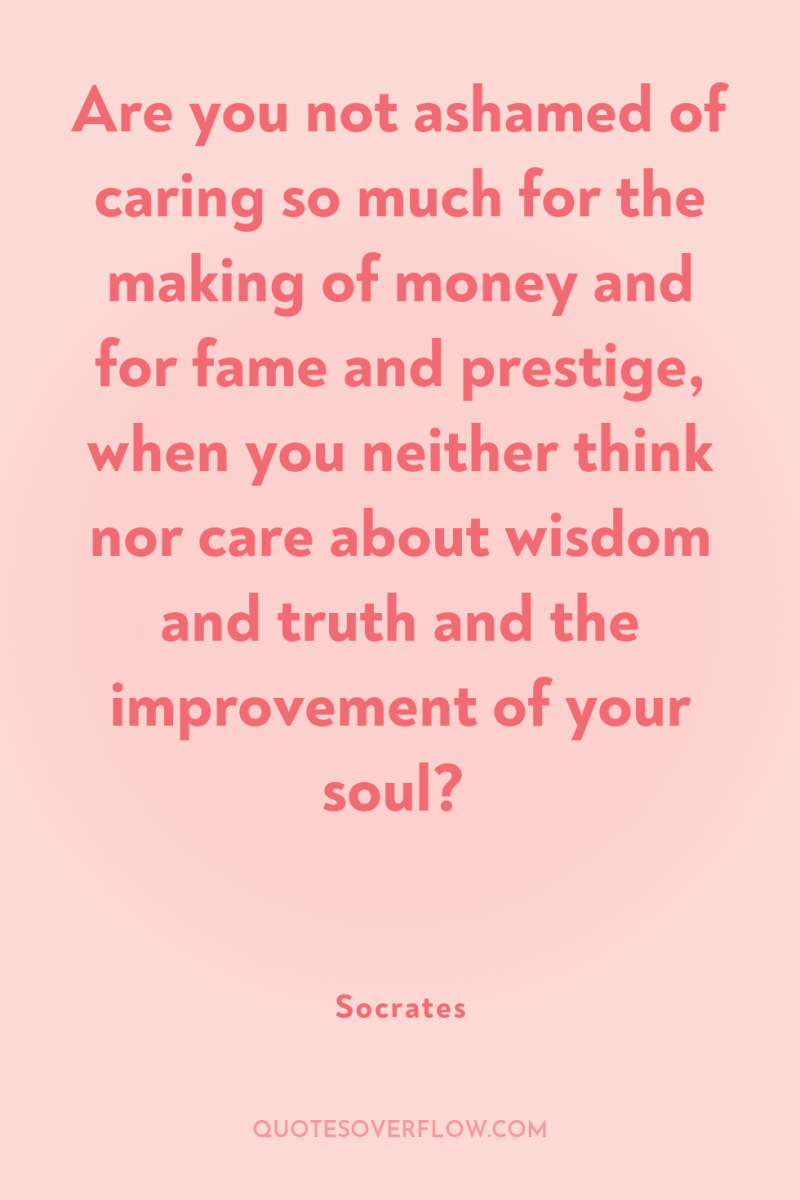
11
Are you not ashamed of caring so much for the making of money and for fame and prestige, when you neither think nor care about wisdom and truth and the improvement of your soul?Socrates
12
Do not trouble about those who practice philosophy, whether they are good or bad; but examine the thing itself well and carefully. And if philosophy appears a bad thing to you, turn every man from it, not only your sons; but if it appears to you such as I think it to be, take courage, pursue it, and practice it, as the saying is, 'both you and your house.Socrates
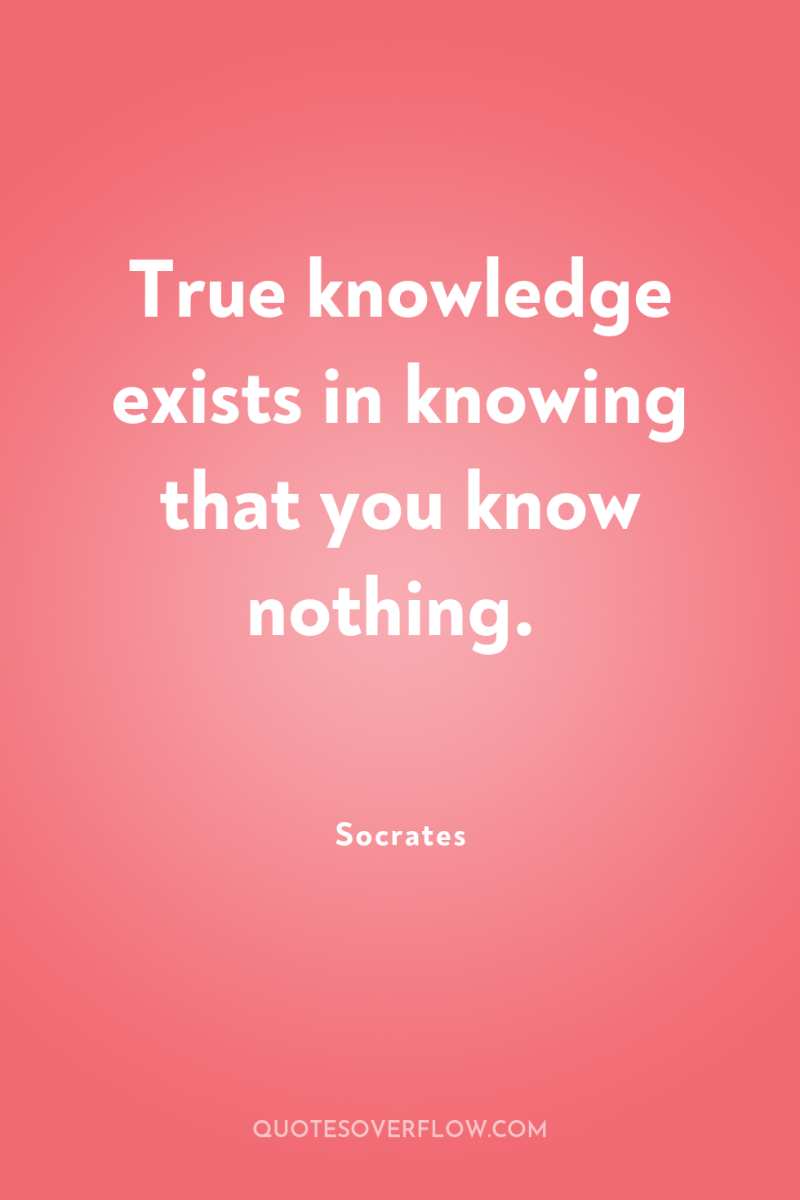
13
True knowledge exists in knowing that you know nothing.Socrates
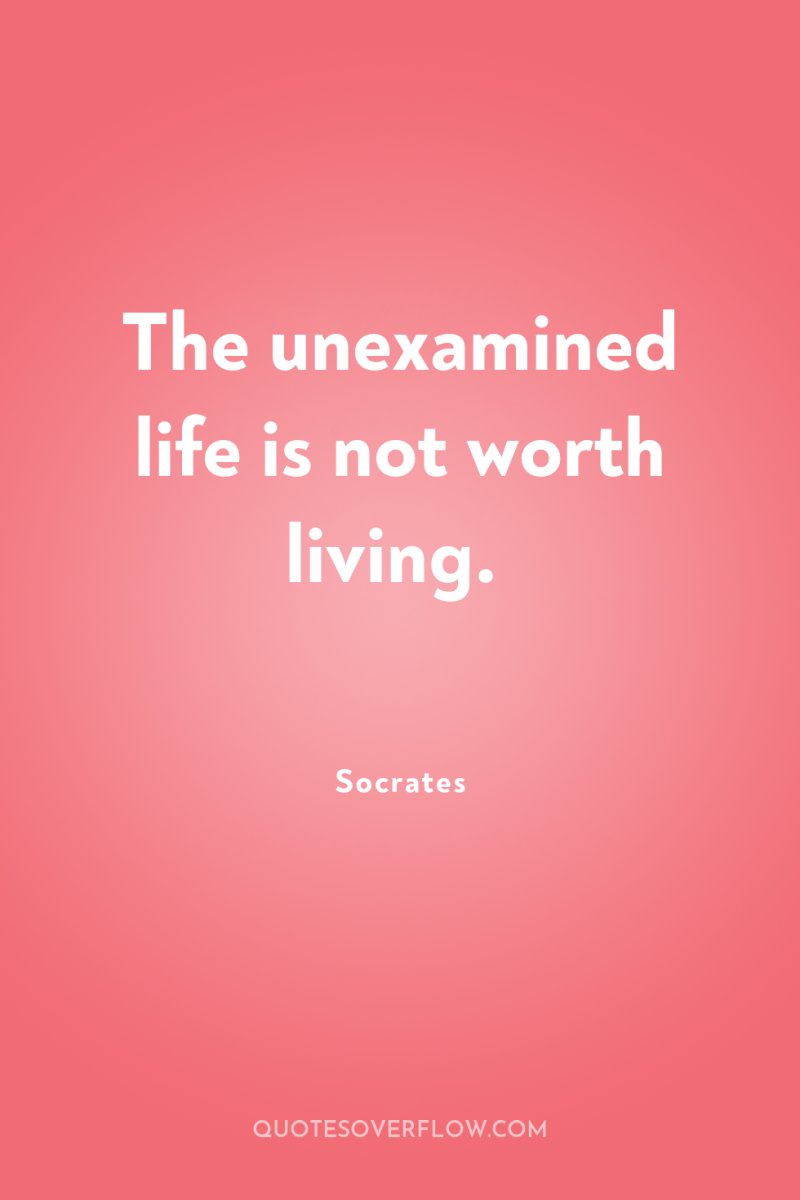
14
The unexamined life is not worth living.Socrates
15
I examined the poets, and I look on them as people whose talent overawes both themselves and others, people who present themselves as wise men and are taken as such, when they are nothing of the sort. From poets, I moved to artists. No one was more ignorant about the arts than I; no one was more convinced that artists possessed really beautiful secrets. However, I noticed that their condition was no better than that of the poets and that both of them have the same misconceptions. Because the most skillful among them excel in their specialty, they look upon themselves as the wisest of men. In my eyes, this presumption completely tarnished their knowledge. As a result, putting myself in the place of the oracle and asking myself what I would prefer to be – what I was or what they were, to know what they have learned or to know that I know nothing – I replied to myself and to the god: I wish to remain who I am. We do not know – neither the sophists, nor the orators, nor the artists, nor I– what the True, the Good, and the Beautiful are. But there is this difference between us: although these people know nothing, they all believe they know something; whereas, I, if I know nothing, at least have no doubts about it. As a result, all this superiority in wisdom which the oracle has attributed to me reduces itself to the single point that I am strongly convinced that I am ignorant of what I do not know. .Socrates
16
God takes away the minds of poets, and uses them as his ministers, as he also uses diviners and holy prophets, in order that we who hear them may know them to be speaking not of themselves who utter these priceless words in a state of unconsciousness, but that God himself is the speaker, and that through them he is conversing with us.Socrates
17
God would seem to indicate to us and not allow us to doubt that these beautiful poems are not human, or the work of man, but divine and the work of God; and that the poets are only the interpreters of the Gods...Socrates
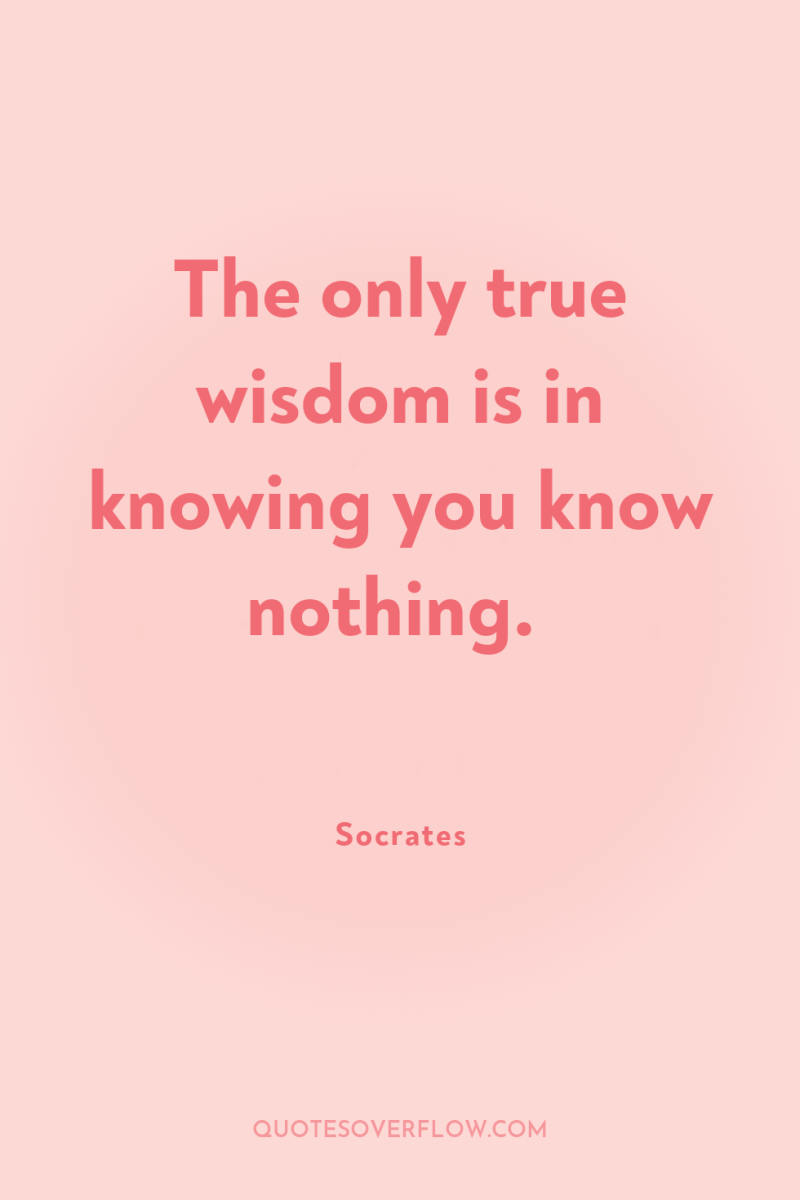
18
The only true wisdom is in knowing you know nothing.Socrates
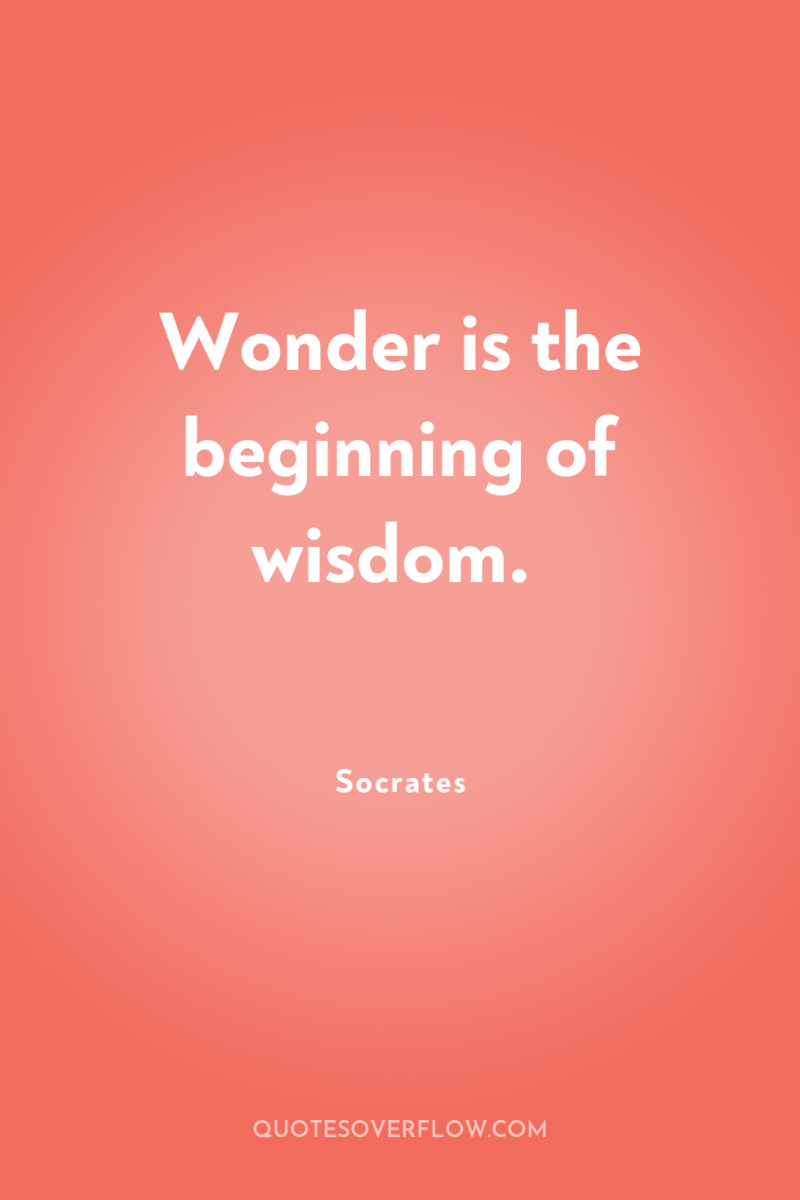
19
Wonder is the beginning of wisdom.Socrates
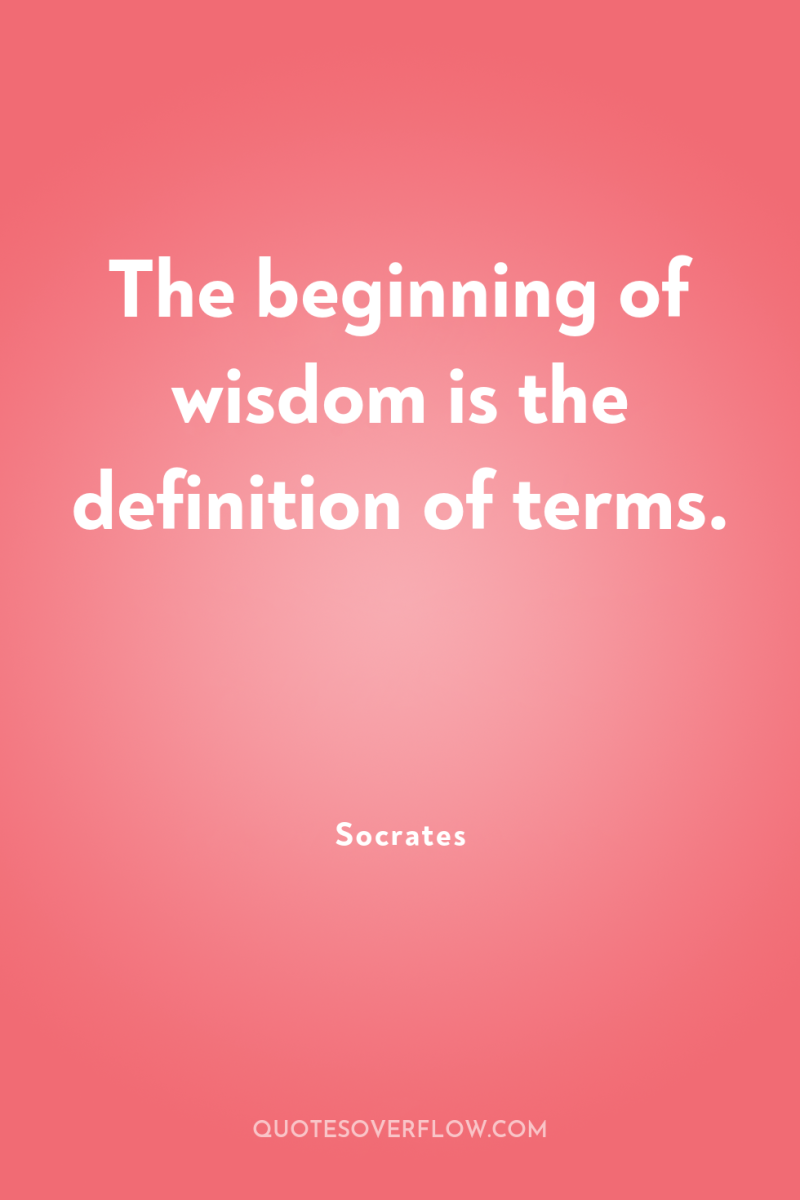
20
The beginning of wisdom is the definition of terms.Socrates
21
If the soul is immortal, it demands our care not only for that part of time which we call life, but for all time; and indeed it would seem now that it will be extremely dangerous to neglect it. If death were a release from everything, it would be a boon for the wicked, because by dying they would be released not only from the body but also from their own wickedness together with the soul; but as it is, since the soul is clearly immortal, it can have no escape of security from evil except by becoming as good and wise as it possibly can. For it takes nothing with it to the next world except its education and training..Socrates
![...[R]eal wisdom is the property of God, and... human wisdom...](https://cdn.quotesoverflow.com/file/quotesoverflow/images/real-wisdom-is-the-property-of392424526696-1200.webp)
22
...[R]eal wisdom is the property of God, and... human wisdom has little or no value.Socrates
23
I went to interview a man with a high reputation for wisdom, because I felt that here if anywhere I should succeed in disproving the oracle and pointing out to my divine authority 'You said that I was the wisest of men, but here is a man who is wiser than I am.' Well, I gave a thorough examination to this person.. and in conversation with him I formed the impression that although in many people's opinion, and especially in his own, he appeared to be wise, in fact he was not. Then when I began to try to show him that he only thought he was wise and was not really so, my efforts were resented both by him and by many of the other people present. However, I reflected as I walked away: 'Well, I am certainly wiser than this man. It is only too likely that neither of us has any knowledge to boast of; but he thinks that he knows something which he does not know, whereas I am quite conscious of my ignorance. At any rate it seems that I am wiser than he is to this small extent, that I do not think that I know what I do not know.. [A]s I pursued my investigation at the god's command,. . my honest impression was.. that the people with the greatest reputations were almost entirely deficient, while others who were supposed to be their inferiors were much better qualified in practical intelligence.Socrates

24
He is richest who is content with the least, for content is the wealth of nature.Socrates

25
The hour of departure has arrived, and we go our separate ways, I to die, and you to live. Which of these two is better only God knows.Socrates
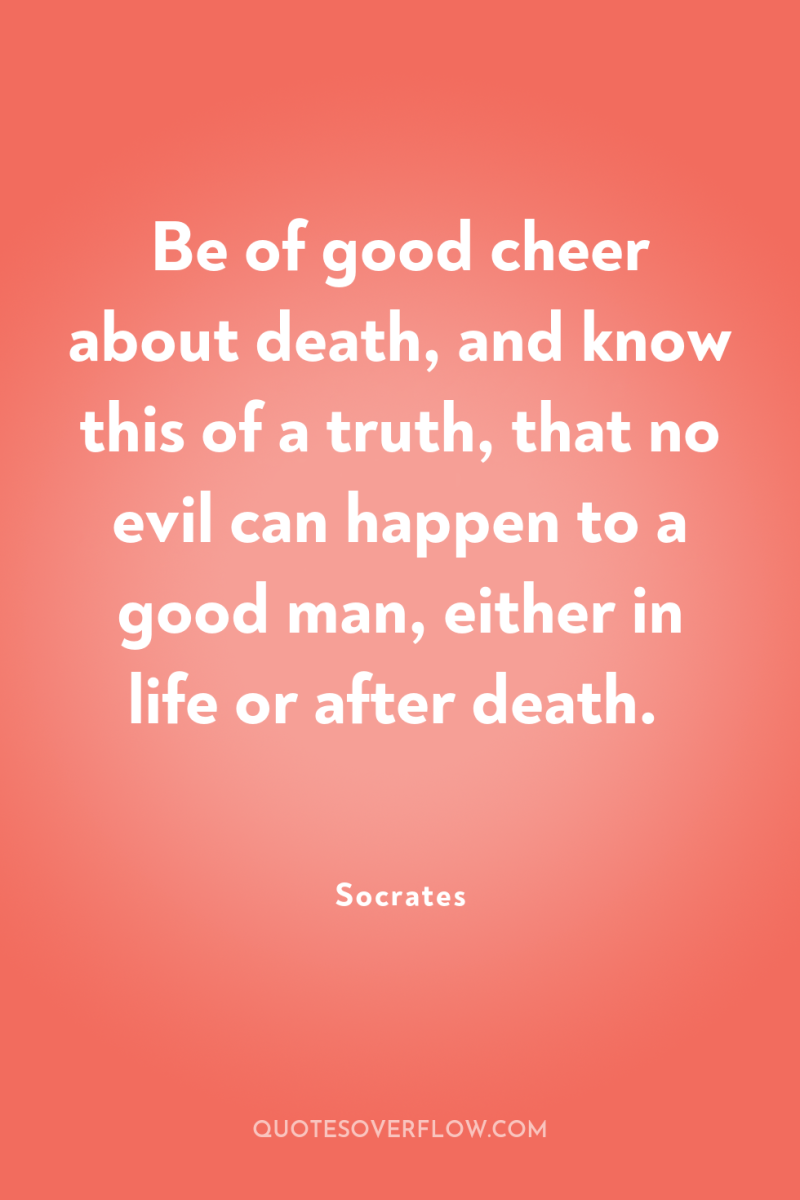
26
Be of good cheer about death, and know this of a truth, that no evil can happen to a good man, either in life or after death.Socrates
27
If a man comes to the door of poetry untouched by the madness of the Muses, believing that technique alone will make him a good poet, he and his sane compositions never reach perfection, but are utterly eclipsed by the performances of the inspired madman.Socrates

28
How many things can I do without?Socrates
29
I decided that it was not wisdom that enabled [poets] to write their poetry, but a kind of instinct or inspiration, such as you find in seers and prophets who deliver all their sublime messages without knowing in the least what they mean.Socrates
30
For the poet is a light and winged and holy thing, and there is no invention in him until he has been inspired and is out of his senses, and the mind is no longer in him: when he has not attained to this state, he is powerless and is unable to utter his oracles.Socrates
31
..I have had a remarkable experience. In the past the prophetic voice to which I have become accustomed has always been my constant companion, opposing me even in quite trivial things if I was going to take the wrong course. Now something has happened to me, as you can see, which might be thought and is commonly considered to be a supreme calamity; yet neither when I left home this morning, nor when I was taking my place here in court, nor at any point in any part of my speech did the divine sign oppose me. In other discussions it has often checked me in the middle of a sentence; but this time it has never opposed me in any part of this business in anything that I have said or done. What do I suppose to be the explanation? I will tell you. I suspect that this thing that has happened to me is a blessing, and we are quite mistaken in supposing death to be an evil. I have good grounds for thinking this, because my accustomed sign could not have failed to oppose me if what I was doing had not been sure to bring some good result. .Socrates

32
The way to gain a good reputation is to endeavor to be what you desire to appear.Socrates
33
...[T]hose who care about their souls and do not subordinate them to the body dissociate themselves firmly from these others and refuse to accompany them on their haphazard journey; and, believing that it is wrong to oppose philosophy with her offer of liberation and purification, they turn and follow her wherever she leads...Socrates
34
...[T]hese people... are my dangerous accusers because those who hear them suppose that anyone who inquires into such matters... theories about the heavens... and everything below the earth... must be an atheist.Socrates

35
Education is the kindling of a flame, not the filling of a vessel.Socrates
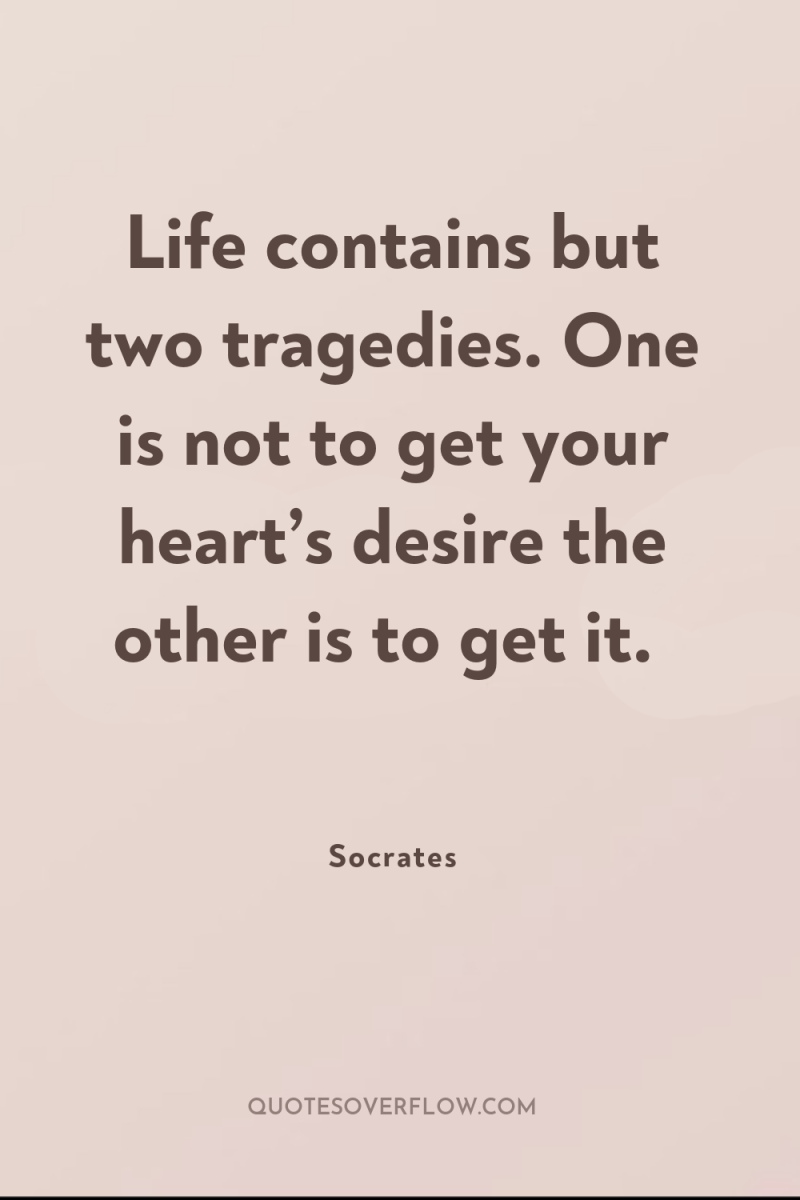
36
Life contains but two tragedies. One is not to get your heart’s desire the other is to get it.Socrates
37
If it were said that without such bones and sinews and all the rest of them I should not be able to do what I think is right, it would be true; but to say that it is because of them that I do what I am doing, and not through choice of what is best - although my actions are controlled by Mind - would be a very lax and inaccurate form of expression.Socrates
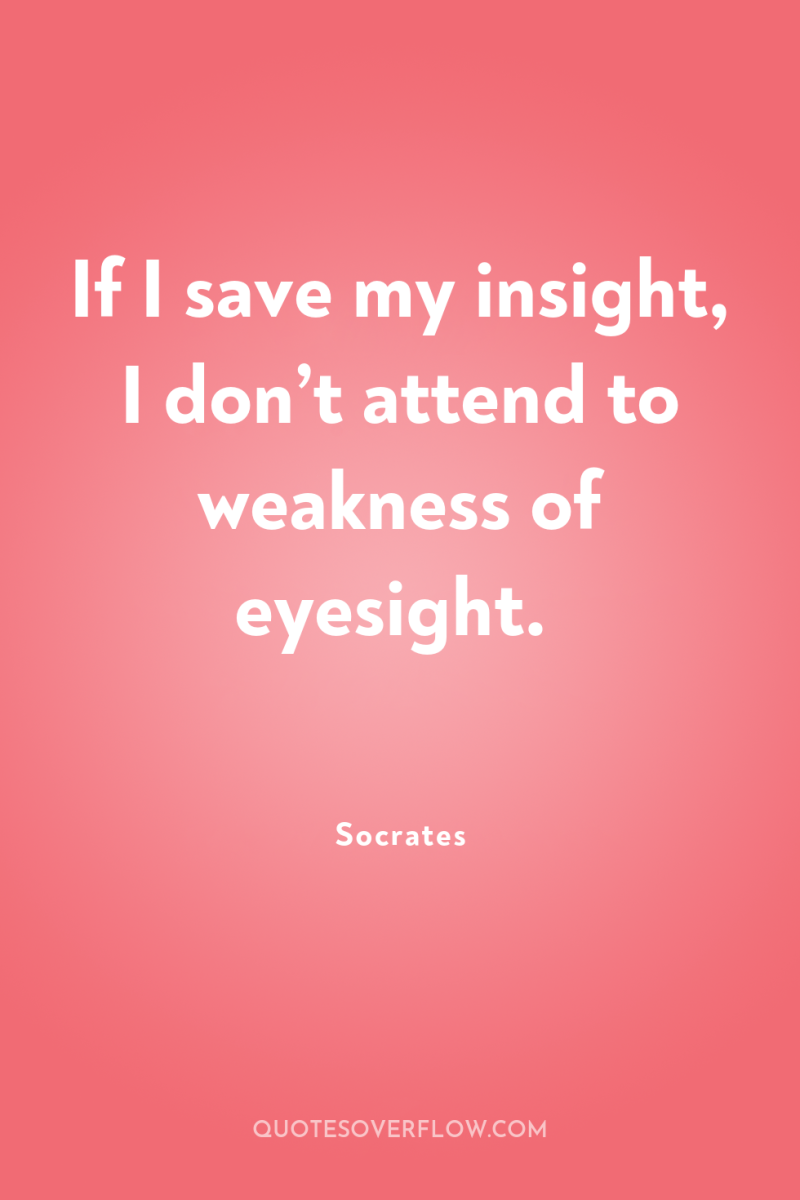
38
If I save my insight, I don’t attend to weakness of eyesight.Socrates
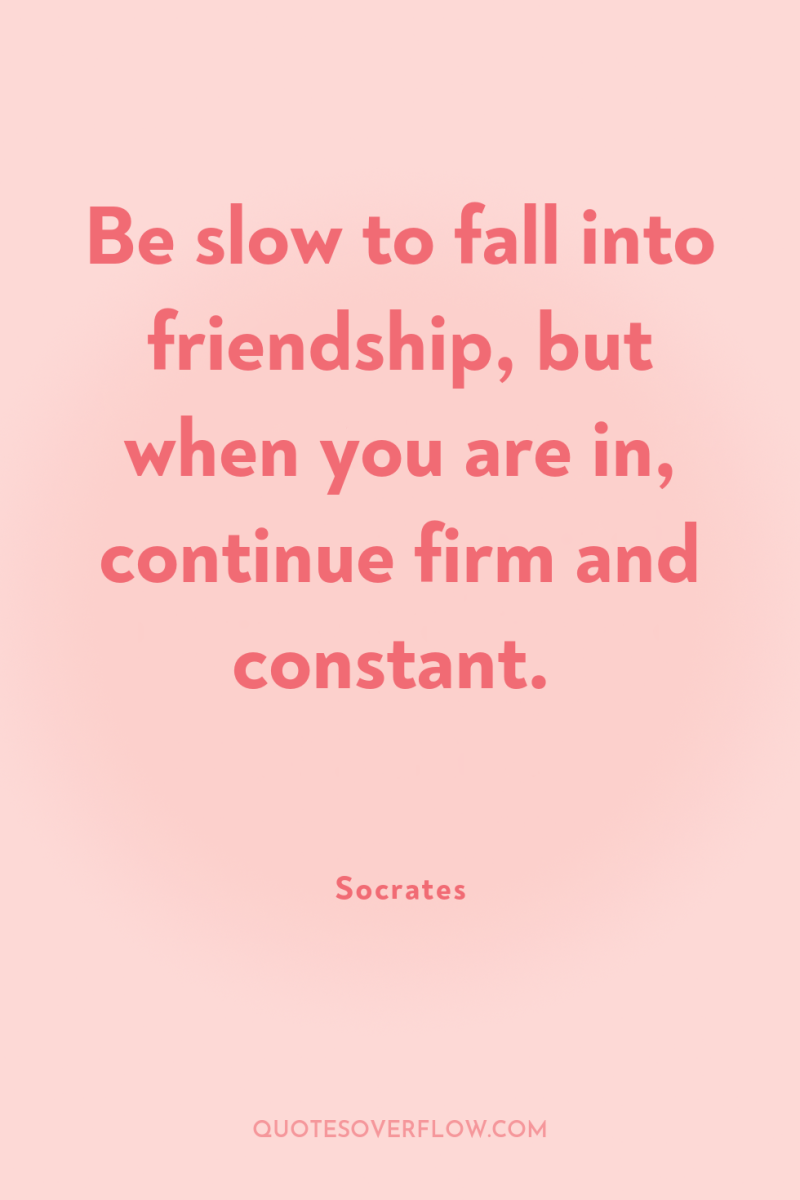
39
Be slow to fall into friendship, but when you are in, continue firm and constant.Socrates

40
Get not your friends by bare compliments, but by giving them sensible tokens of your love.Socrates

41
Once made equal to man, woman becomes his superior.Socrates

42
Let him who would move the world first move himself.Socrates
43
It seems to me that whatever else is beautiful apart from absolute Beauty is beautiful because it partakes of that absolute Beauty, and for no other reason... [I]t is by Beauty that beautiful things are beautiful.Socrates
44
There is one way, then, in which a man can be free from all anxiety about the fate of his soul - if in life he has abandoned bodily pleasures and adornments, as foreign to his purpose and likely to do more harm than good, and has devoted himself to the pleasures of acquiring knowledge, and so by decking his soul not with a borrowed beauty but with its own - with self-control, and goodness, and courage, and liberality, and truth - has fitted himself to await his journey in the next world.Socrates
45
...[W]hen death comes to a man, the mortal part of him dies, but the immortal part retires at the approach of death and escapes unharmed and indestructible... [I]t is as certain as anything can be... that soul is immortal and imperishable, and that our souls will really exist in the next world.Socrates
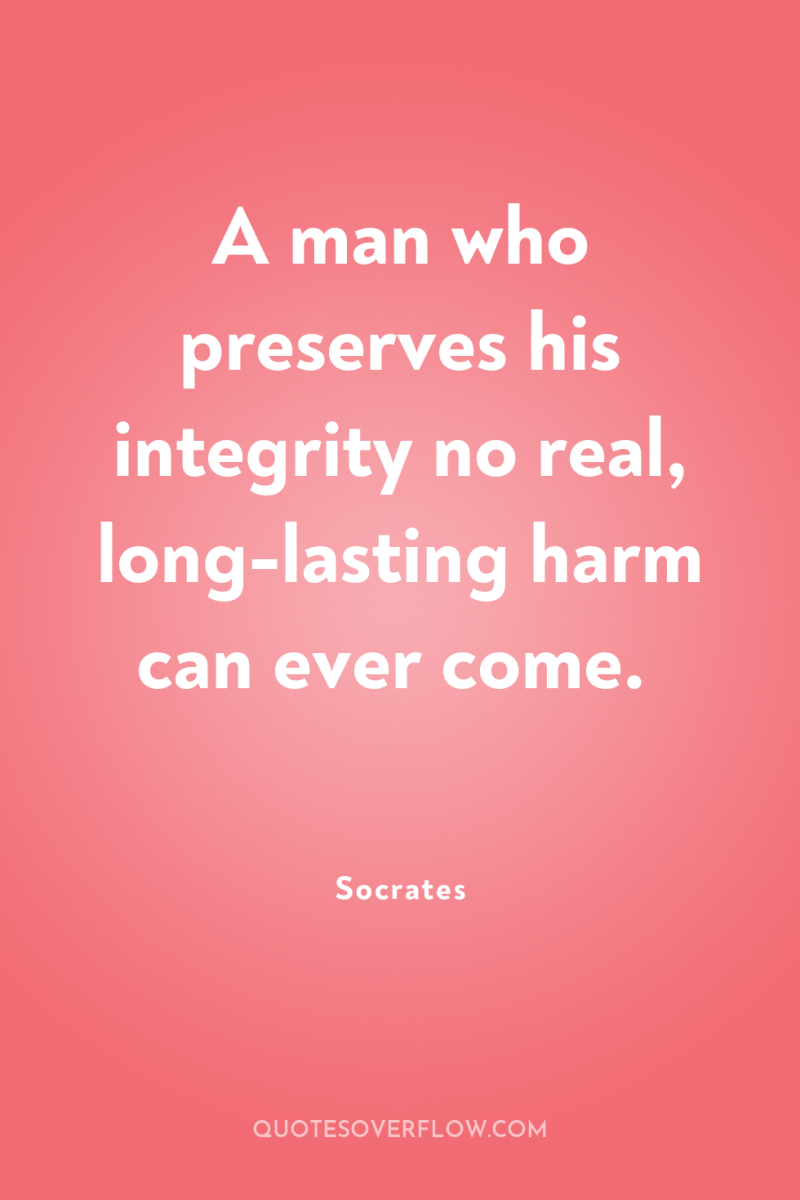
46
A man who preserves his integrity no real, long-lasting harm can ever come.Socrates
47
I know one thing, that I know nothing.Socrates
48
By all means marry; if you get a good wife, you’ll become happy; if you get a bad one, you’ll become a philosopher.Socrates
49
..[Y]ou know very well the truth of what I [say].. I have incurred a great deal of bitter hostility; and this is what will bring about my destruction, if anything does.. the slander and jealousy of a very large section of the people. They have been fatal to a great many other innocent men, and I suppose will continue to be so; there is no likelihood that they will stop at me. But perhaps someone will say 'Do you feel no compunction, Socrates, at having followed a line of action which puts you in danger of the death-penalty?' I might fairly reply to him 'You are mistaken, my friend, if you think that a man who is worth anything ought to spend his time weighing up the prospects of life and death. He has only one thing to consider in performing any action; that is, whether he is acting rightly or wrongly, like a good man or a bad one..['] The truth of the matter is this, gentlemen. Where a man has once taken up his stand, either because it seems best to him or in obedience to his orders, there I believe he is bound to remain and face the danger, taking no account of death or anything else before dishonour. .Socrates
50
Suppose.. that you acquit me.. Suppose that, in view of this, you said to me 'Socrates, on this occasion we shall disregard Anytus and acquit you, but only on one condition, that you give up spending your time on this quest and stop philosophizing. If we catch you going on in the same way, you shall be put to death.' Well, supposing, as I said, that you should offer to acquit me on these terms, I should reply 'Gentlemen, I am your very grateful and devoted servant, but I owe a greater obedience to God than to you; and so long as I draw breath and have my faculties, I shall never stop practicing philosophy and exhorting you and elucidating the truth for everyone that I meet. I shall go on saying, in my usual way, "My very good friend, you are an Athenian and belong to a city which is the greatest and most famous in the world for its wisdom and strength. Are you not ashamed that you give your attention to acquiring as much money as possible, and similarly with reputation and honour, and give no attention or thought to truth and understanding and the perfection of your soul?" And if any of you disputes this and professes to care about these things, I shall not at once let him go or leave him; no, I shall question him and examine him and test him; and if it appears that in spite of his profession he has made no real progress towards goodness, I shall reprove him for neglecting what is of supreme importance, and giving his attention to trivialities. I shall do this to everyone that I meet, young or old, foreigner or fellow-citizen; but especially to you my fellow-citizens, inasmuch as you are closer to me in kinship. This, I do assure you, is what my God commands; and it is my belief that no greater good has ever befallen you in this city than my service to my God; for I spend all my time going about trying to persuade you, young and old, to make your first and chief concern not for your bodies nor for your possessions, but for the highest welfare of your souls, proclaiming as I go 'Wealth does not bring goodness, but goodness brings wealth and every other blessing, both to the individual and to the State.' ..And so, gentlemen, I would say, 'You can please yourselves whether you listen to Anytus or not, and whether you acquit me or not; you know that I am not going to alter my conduct, not even if I have to die a hundred deaths.Socrates
51
...[S]ome of the opinions which people entertain should be respected, and others should not.Socrates
52
One should never do wrong in return, nor mistreat any man, no matter how one has been mistreated by him.Socrates
53
To know, is to know that you know nothing. That is the meaning of true knowledge.Socrates
54
Be true to thine own selfSocrates
55
I am convinced that I never wrong anyone intentionally...Socrates
56
How can you wonder your travels do you no good, when you carry yourself around with you?Socrates
57
Wealth does not bring goodness, but goodness brings wealth and every other blessing, both to the individual and to the stateSocrates
58
Wealth does not bring about excellence, but excellence makes wealth and everything else good for men, both individually and collectively.Socrates
59
The only thing I know is that I know nothing, and i am no quite sure that i know that.Socrates
60
...[M]en are put in a sort of guard-post, from which one must not release one's self or run away...Socrates
61
The misuse of language induces evil in the soulSocrates
62
I know that I am intelligent, because I know that I know nothing.Socrates
63
My friend...care for your psyche...know thyself, for once we know ourselves, we may learn how to care for ourselves" -SocratesSocrates
64
..I do not think that it is right for a man to appeal to the jury or to get himself acquitted by doing so; he ought to inform them of the facts and convince them by argument. The jury does not sit to dispense justice as a favour, but to decide where justice lies; and the oath which they have sworn is not to show favour at their own discretion, but to return a just and lawful verdict.. Therefore you must not expect me, gentlemen, to behave towards you in a way which I consider neither reputable nor moral nor consistent with my religious duty.Socrates
65
...[F]rom me you shall hear the whole truth; not, I can assure you, gentlemen, in flowery language... decked out with fine words and phrases; no, what you will hear will be a straightforward speech in the first words that occur to me, confident as I am in the justice of my cause; and I do not want any of you to expect anything different.Socrates
66
Is it true; is it kind, or is it necessary?Socrates
67
We cannot live better than in seeking to become better.Socrates
68
...[T]he really important thing is not to live, but to live well... [a]nd to live well means the same thing as to live honourably or rightly...Socrates
69
Do you imagine that a city can continue to exist and not be turned upside down, if the legal judgments which are pronounced in it have no force but are nullified and destroyed by private persons?Socrates
70
A man who really fights for justice must lead a private, not a public, life if he is to survive for even a short time.Socrates
71
The true champion of justice, if he intends to survive even for a short time, must necessarily confine himself to private life and leave politics alone.Socrates
72
...a good man cannot be harmed either in life or in death, and that his affairs are not neglected by the gods.Socrates
73
One day, the old wise Socrates walks down the streets, when all of the sudden a man runs up to him "Socrates I have to tell you something about your friend who.."" Hold up" Socrates interrupts him "About the story you're about to tell me, did you put it trough the three sieves?"" Three sieves?" The man asks "What three sieves?"" Let's try it" Socrates says." The first sieve is the one of truth, did you examine what you were about to tell me if it is true?" Socrates asks." Well no, I just overheard it" The man says." Ah, well then you have used the second sieve, the sieve of good?" Socrates asks "Is it something good what you're about to tell me?"" Ehm no, on the contrary" the man answers." Hmmm" The wise man says "Let's use the third sieve then, is it necessary to tell me what you're so exited about?"" No not necessary" the man says." Well" Socrates says with a smile "If the story you're about to tell me isn't true, good or necessary, just forget it and don't bother me with it.Socrates
74
..[I]f at the time of its release the soul is tainted and impure, because it has always associated with the body and cared for it and loved it, and has been so beguiled by the body and its passions and pleasures that nothing seems real to it but those physical things which can be touched and seen and eaten and drunk and used for sexual enjoyment; and if it is accustomed to hate and fear and avoid what is invisible and hidden from our eyes, but intelligible and comprehensible by philosophy - if the soul is in this state, do you think that it will escape independent and uncontaminated? .Socrates
75
..I do not believe that the law of God permits a better man to be harmed by a worse. No doubt my accuser might put me to death or have me banished or deprived of civic rights; but even if he thinks, as he probably does (and others to, I dare say), that these are great calamities, I do not think so.. For let me tell you, gentlemen, that to be afraid of death is only another form of thinking that one is wise when one is not; it is to think that one knows what one does not know. No one knows with regard to death whether it is not really the greatest blessing that can happen to a man; but people dread it as though they were certain that it is the greatest evil; and this ignorance, which thinks that it knows what it does not, must surely be ignorance most culpable. This, I take it, gentlemen, is the degree, and this is the nature of my advantage over the rest of mankind; and if I were to claim to be wiser than my neighbour in any respect, it would be in this: that not possessing any real knowledge of what comes after death, I am also conscious that I do not possess it. But I do know that to do wrong and to disobey my superior, whether God or man, is wicked and dishonourable; and so I shall never feel more fear or aversion for something which, for all I know, may really be a blessing, than for those evils which I know to be evils.Socrates
76
All I know is that I do not know anythingSocrates
77
Intelligent individuals learn from every thing and every one; average people, from their experiences. The stupid already have all the answers.Socrates
78
Regard your good name as the richest jewel you can possibly be possessed of -- for credit is like fire; when once you have kindled it you may easily preserve it, but if you once extinguish it, you will find it an arduous task to rekindle it again. The way to a good reputation is to endeavor to be what you desire to appear.Socrates
79
To find the Father of all is hard. And when found, it is impossible to utter Him.Socrates
80
Such as thy words are such will thine affections be esteemed and such as thine affections will be thy deeds and such as thy deeds will be thy life ...Socrates
81
By far the greatest and most admirable form of wisdom is that needed to plan and beautify cities and human communities.Socrates
82
To fear death, gentlemen, is no other than to think oneself wise when one is not, to think one knows what one does not know. No one knows whether death may not be the greatest of all blessings for a man, yet men fear it as if they knew that it is the greatest of evils.Socrates
83
No one knows whether death may not be the greatest of all blessings for a man, yet men fear it as if they knew it was the greatest of evils.Socrates
84
The greatest way to live with honour in this world is to be what we pretend to be.Socrates
85
He who is not contented with what he has, would not be contented with what he would like to have.Socrates
86
. is there not one true coin for which all things ought to exchange?- and that is wisdom; and only in exchange for this, and in company with this, is anything truly bought or sold, whether courage, temperance or justice. And is not all true virtue the companion of wisdom, no matter what fears or pleasures or other similar goods or evils may or may not attend her? But the virtue which is made up of these goods, when they are severed from wisdom and exchanged with one another, is a shadow of virtue only, nor is there any freedom or health or truth in her; but in the true exchange there is a purging away of all these things, and temperance, and justice, and courage, and wisdom herself, are a purgation of them.Socrates
87
One who is injured ought not to return the injury, for on no account can it be right to do an injustice; and it is not right to return an injury, or to do evil to any man, however much we have suffered from him.Socrates
88
An honest man is always a child.Socrates
89
If the soul is immortal, it demands our care not only for that part of time which we call life, but for all time: and indeed it would seem now that it will be extremely dangerous to neglect it. If death were a release from everything, it would be a boon for the wicked. But since the soul is clearly immortal, it can have no escape or security from evil except by becoming as good and wise as it possibly can. For it takes nothing with it to the next world except its education and training: and these, we are told, are of supreme importance in helping or harming the newly dead at the very beginning of his journey there. .Socrates
90
To find yourself, think for yourself.Socrates
91
You are wrong sir, if you think that a man who is any good at all should take into account the risk of life or death; he should look to this only in his actions, whether what he does is right or wrong.Socrates
92
Wisdom is knowing you know nothingSocrates
93
If all our misfortunes were laid in one common heap whence everyone must take an equal portion, most people would be content to take their own and depart.Socrates
94
When you want wisdom and insight as badly as you want to breathe, it is then you shall have it.Socrates
95
The poets are only the interpreters of the gods.Socrates
96
I am a citizen not of Athens or Greece but of the world.Socrates
97
Fame is the perfume of heroic deeds.Socrates
98
How many things there are which I do not want.Socrates
99
If all misfortunes were laid in one common heap whence everyone must take an equal portion most people would be contented to take their own and depart.Socrates
100
Be slow to fall into friendship but when thou art in continue firm and constant.Socrates